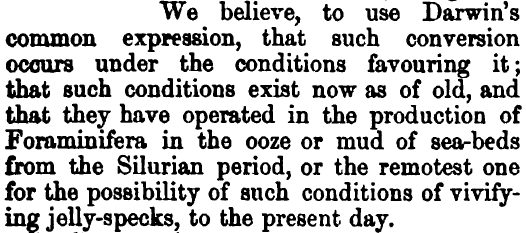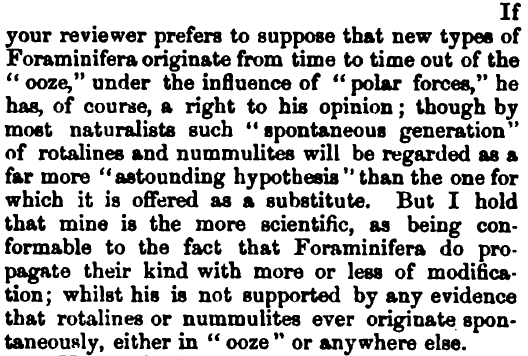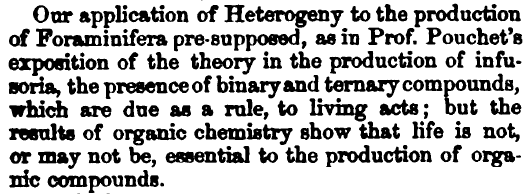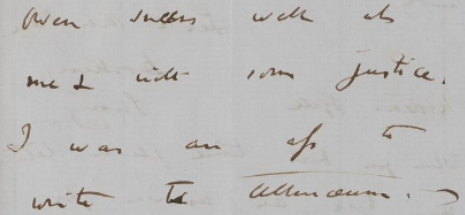In my last post I looked at a review (pp 417-9) by anatomist and palaeontologist Richard Owen of a book by William Carpenter about the Foraminifera, a single-celled organism with shells or tests (internal shells). Carpenter had argued that the multitude of Foraminifera species had descended from one or a few primordial forms. Owen thought he recognised in this the influence of Darwin, who had proposed in Origin of Species that all living things had descended from one or a few primordial forms, into which life had been breathed by ‘the Creator’.
Owen saw in Darwin’s appeal to divine action a departure from the scientific method, which in his view demanded, or at least gave preference to, explanations from natural processes only. While admitting that the Foraminifera underwent reproduction, he believed that they were also being spontaneously generated from dead organic matter through the action of a vital force. ‘Mucus’ was converted from a ‘passive’ to an ‘active’ state, from ‘snot’ to ‘sarcode’ by means of the conversion of the operation of a ‘polar’ force – an analogy being drawn with magnetic phenomena – from an ‘attractive’ to an ‘assimilative’ or ‘vital’ mode (418, col.3, 419, col. 1):
Such a conversion would occur when the conditions were right, at the present day just as much as in times past:
As to the question of whether such a spontaneous production could occur before dead organic material was available, I have not found a definite answer given by Owen in his review. But he did address the ‘inevitable question’ of “Whence the first organic matter?” in a book written five years later.
In his Anatomy of Vertebrates (Vol. 3, Mammals, 1868) Owen described his position as ‘nomogenist’ (genesis by law), and Darwin’s as ‘thaumatogenist’ (genesis by miracle). His best answer is that the Nomogenist should identify the constituent elements of the simplest living entities and evaluate the probability of them ‘combining’ in such a way as to allow the emergence of a ‘vital force’ (Anatomy, III, 817):
The probability is to be evaluated not absolutely, but relative to the probability of these elements being combined supernaturally, apart from natural law, to bring about the first life:
He concluded (pp 817-8) that it was more consistent with ‘the present phase of dynamical science’ and the ‘observed gradations of living things’ to believe in spontaneous generation than in special creation:
……
Carpenter’s reply (4 April 1863, athenÆum)
Carpenter replied to Owen in the next edition of the weekly Athenæum, granting his reviewer the right to suppose that:
new types of Foraminifera originate from time to time out of the “ooze,” under the influence of “polar forces”
if that was his preference, but as for himself, given that the organisms were known to reproduce themselves, whereas there was not in his view any evidence for spontaneous generation, he found it more scientific to suppose that they had descended from ancient ancestors (p. 461, col. 2):
Darwin’s intervention (25 April 1863, athenæum)
Darwin pursued the attack three weeks later, finding Owen’s ideas obscure, hidden as it were in the slimy ooze from which living organisms had been supposed to emerge (p. 554, col.s 2-3):
Darwin then put the question of spontaneous generation at its starkest by pointing out that the first organisms would have to have been produced from entirely inorganic matter:
He was clearly aware of the possibility that the atmosphere of an early earth could have been different from that of his day, and he was willing to allow for the most generous assumptions to be made about its composition (‘carbonic acid’ is carbon dioxide (OED, ‘carbonic acid’, 1.)):
He then asked whether there was
a fact, or a shadow of a fact
in support of the notion that these inorganic elements and compounds, acted on only by known forces, could produce a living creature. He found such an outcome to be
absolutely inconceivable
at least in the present state of knowledge:
Darwin found merit in Owen’s criticism of his use of biblical expressions, but may be offering a partial defence on the basis that the Origin of Species was not necessarily a ‘purely scientific work’:
He then effectively retracts the avowal he had made of creative work, reinterpreting it, as in the letter to Hooker of 29 March which I discussed in my last post, as merely an expression of ignorance rather than of belief:
Owen’s reply to darwin (2 May 1863, athenÆum)
Owen replied to Darwin in the Athaneum a week later (2 May, p. 586), drawing heavily on the researches of Félix Pouchet, a professor at the School of Medicine in Rouen, who in his ‘Hétérogénie ou traité de la génération spontanée‘ (1859) had made a case for the spontaneous generation of living organisms from organic compounds. If from organic, then perhaps also from inorganic, Owen seems to suggest, since organic chemistry had demonstrated that there was no absolute barrier between them:
The ‘results of organic chemistry’ that Owen referred must have been the recent demonstrations that organic substances could be derived from inorganic materials in the laboratory. Albert Wöhler had synthesised urea (CO(NH₂)₂) in 1828, Hermann Kolbe had produced acetic acid (CH3COOH) in 1845, Adolph Strecker had obtained the amino acid alanine (C3H7NO2) in 1850, and Perkin and Duppa the simplest amino acid glycine (C2H5NO2) in 1858.
Owen found Pouchet’s Hétérogénie to be exemplary in its:
calm, clear and close philosophical experimental research and exposition
in contrast to Darwin’s Origin of Species with its:
mere speculative views and … expressions of feelings of belief and conviction
but lack of sound basis for its opinions:
Having seemed, in his review of Carpenter, to mock Darwin for employing a Pentateuchal expression, Owen now himself adduced the first chapter of Genesis in support of spontaneous generation, pointing out that it was man into whom God had breathed life, whereas the plants and sea creatures were to be brought forth from the earth and the sea, perhaps allowing for a continuing generation:
The quotation from Genesis 1.20 is marginally inaccurate:
וַיֹּאמֶר אֱלֹהִים–יִשְׁרְצוּ הַמַּיִם, שֶׁרֶץ נֶפֶשׁ חַיָּה
And God said, Let the waters bring forth abundantly the moving creature that hath life,[KJV]
but the point was not without merit that it was into the man that God breathed the breath of life (Genesis 2.7), not into His lesser creatures.
aftermath (7 may 1863)
Hooker considered Owen to have triumphed over Darwin, at least ‘in the eyes of the public, whom you wish to enlighten’ (letter 7 May 1863):
and Darwin told Charles Lyell the same day by letter that ‘Owen sneers well at me and with some justice’, and that he had been ‘an ass to write to the Athenæum’:
Public perceptions might have been different if the exchange between Darwin and Owen had taken place two years later, after the French Académie des Sciences had decided in favour of Pasteur and against Pouchet in the contest over spontaneous generation held before it.
Time would prove Darwin right about spontaneous generation. Was he right also about the origin of life? More than 150 years later, after all the wonderful advances in our understanding of living organisms at the molecular level, is there
‘a fact, or a shadow of a fact
supporting the belief’ that inorganic compounds
‘acted on only by known forces
could produce a living creature?’ I give Darwin the last word:
Andrew Chapman



















